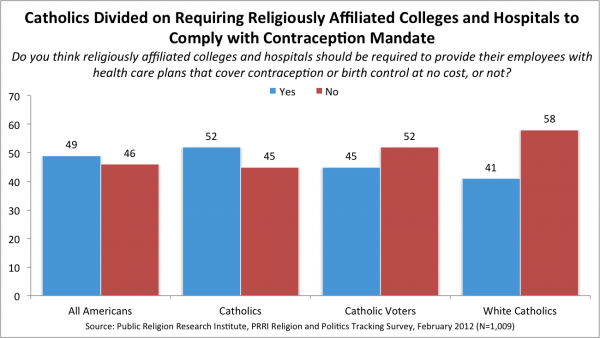I. Most Americans Say Employer Health Care Plans Should Include Contraception Coverage
A majority (55%) of Americans agree that “employers should be required to provide their employees with health care plans that cover contraception and birth control at no cost.” Four-in-ten (40%) disagree with this requirement.
There are major religious, generational and political divisions: Roughly 6-in-10 Catholics (58%) believe that employers should be required to provide their employees with health care plans that cover contraception. Among Catholic voters, support for this requirement is slightly lower at 52%. Only half (50%) of white Catholics support this requirement, compared to 47% who oppose it. Among other religious Americans, 61% of religiously unaffiliated Americans believe that employers should be required to provide their employees with health care plans that cover contraception, compared to only half (50%) of white mainline Protestants and less than 4-in-10 (38%) white evangelical Protestants.
Nearly three-quarters (73%) of Democrats, a slim majority (51%) of political Independents and less than 4-in-10 (36%) of Republicans agree that employer health care coverage should include contraception at no cost.
Younger Americans are much more supportive of the requirement. Nearly two-thirds (65%) of Millennials (age 18-29) agree that employer health care coverage should include contraception at no cost, compared to 4-in-10 (40%) seniors (age 65+).
Women are significantly more likely than men to agree that employers should be required to provide health care plans that cover contraception (62% vs. 47% respectively).
II. Public Divided Over Exemptions for Religious Colleges & Hospitals
Nearly half (49%) of Americans say that religiously affiliated colleges and hospitals should be required to provide their employees with health care plans that cover contraception or birth control at no cost. Forty-six percent say they should not have to provide this type of coverage.
A majority of Catholics (52%) say that religiously affiliated colleges and hospitals should have to provide coverage that includes contraception. Among Catholic voters, however, only 45% support this requirement, while 52% oppose it. Only about 4-in-10 (41%) white Catholics support this requirement, compared to 58% who oppose it.
Among other religious groups, 59% of the unaffiliated say that religiously affiliated colleges and hospitals should have to provide coverage that includes contraception, compared to less than one-third (31%) of white evangelical Protestants. White mainline Protestants are about evenly divided (45% say that hospitals and colleges should provide coverage, 48% say they should not).
Nearly 6-in-10 (58%) Millennials say that religiously affiliated colleges and hospitals should have to provide health care plans that include contraception coverage, compared to only one-third (33%) of seniors.
Women are also significantly more likely than men to say that religiously affiliated colleges and hospitals should provide this coverage (54% to 43% respectively).
There is stronger support for exemptions for churches and other places of worship. Nearly 6-in-10 (57%) of Americans say that churches should NOT be required to provide their employees with health care plans that cover contraception or birth control at no cost. Less than 4-in-10 (36%) say that they should.
Like other religious groups, a strong majority of all Catholics (59%), Catholic voters (68%), and white Catholics (72%) say that churches and other places of worship should not be required to provide their employees with health care plans that cover contraception.
Strong majorities of white evangelicals (73%), white mainline Protestants (64%) and Catholics (59%) believe that churches and other places of worship should not be required to provide their employees with health care plans that cover contraception.
III. Parental Approval of Birth Control for Teenagers Age 14+
Most Americans (55%) disagree that birth control should be generally available to teenagers age 14 and older without parental approval. Roughly 4-in-10 (41%) agree. There are major generational and religious differences.
A majority of white evangelicals (71%), Catholics (61%) and white mainline Protestants (55%) disagree that birth control should be generally available for teenagers age 14 and older without parental approval. Six-in-ten (60%) religiously unaffiliated Americans believe that it should be generally available.
A majority (54%) of Millennials also believe that birth control should be generally available to teenagers age 14 and older without parental approval, compared to just 29% of seniors.
IV. Views about American Muslims
Fourteen percent of Americans agree that American Muslims want to establish Shari’a or Islamic law as law of the land. More than two-thirds (68%) disagree.
A majority (54%) of Americans believe that American Muslims are an important part of the religious community in the U.S. One-third of the public disagrees and roughly one-in-seven (14%) report that they do not know.
Recommended citation:
Jones, Robert P., and Daniel Cox. “Most Catholics Say Employers Should Provide Health Care Plans that Cover Birth Control.” PRRI. 2012. http://www.prri.org/research/january-tracking-poll-2012/.




